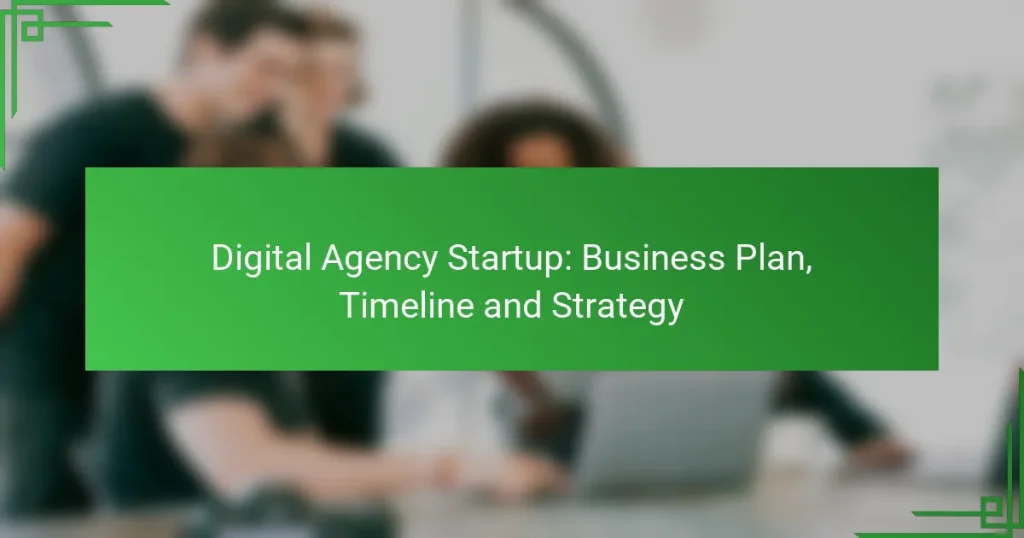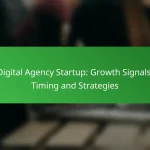Starting a digital agency requires a well-structured business plan that defines your vision, target market, and services, along with a clear marketing strategy and financial projections. Establishing a timeline with key milestones is crucial for a successful launch, allowing you to manage resources and track progress effectively. By prioritizing client acquisition, strategic partnerships, and service differentiation, you can build a strong market presence and ensure sustainable growth.
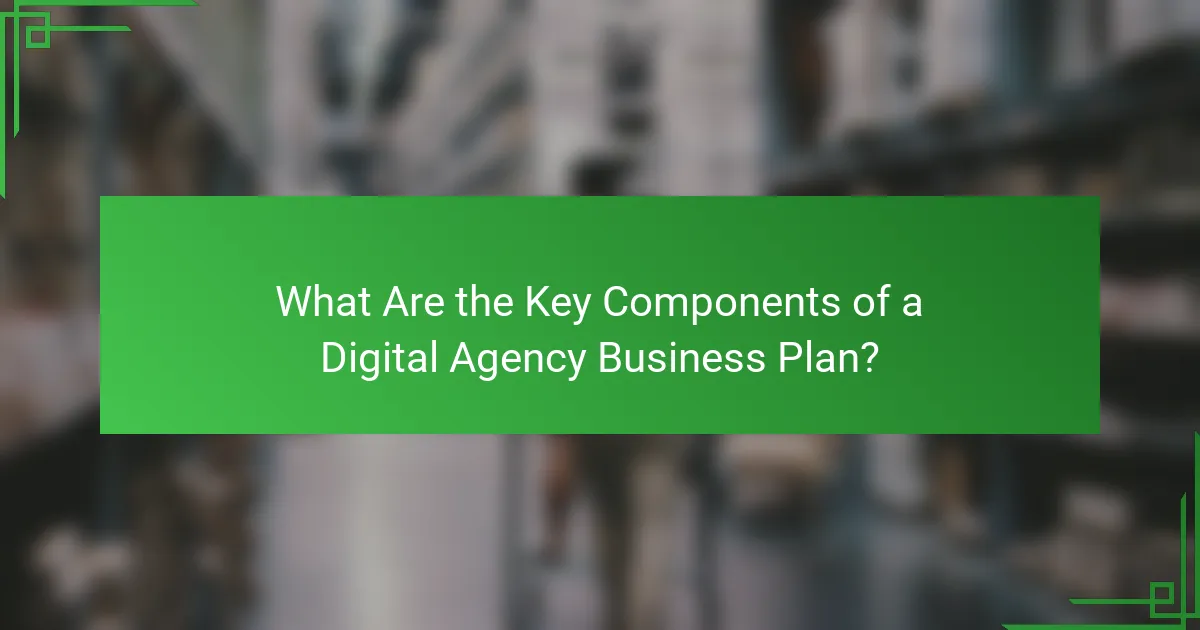
What Are the Key Components of a Digital Agency Business Plan?
A digital agency business plan should include essential components that outline the agency’s vision, target market, services, marketing approach, and financial expectations. These elements provide a roadmap for launching and growing the agency effectively.
Executive summary
The executive summary is a concise overview of the business plan, highlighting the agency’s mission, goals, and key offerings. It should capture the essence of your agency and entice potential investors or partners to read further.
Include a brief description of your target market and the unique value proposition your agency brings. This section should be engaging and informative, setting the tone for the rest of the plan.
Market analysis
Market analysis involves researching the industry landscape, identifying target customers, and understanding competitors. This section should detail market trends, customer demographics, and potential challenges.
Use tools like SWOT analysis (Strengths, Weaknesses, Opportunities, Threats) to assess your agency’s position. Highlight any gaps in the market that your agency can fill, which can help in crafting a compelling narrative for stakeholders.
Service offerings
Clearly define the services your digital agency will provide, such as web design, social media management, SEO, or content marketing. Each service should align with market demand and your agency’s expertise.
Consider bundling services into packages to appeal to different client needs. For example, a starter package might include basic web design and social media setup, while a premium package could offer comprehensive digital marketing strategies.
Marketing strategy
Your marketing strategy outlines how you will attract and retain clients. This includes online and offline tactics such as social media campaigns, content marketing, networking events, and partnerships.
Utilize digital channels effectively, focusing on SEO and pay-per-click advertising to drive traffic. Establish a strong brand presence through consistent messaging and engaging content to build trust with potential clients.
Financial projections
Financial projections provide an estimate of revenue, expenses, and profitability over a specified period, typically three to five years. Include startup costs, ongoing expenses, and anticipated income from services.
Use conservative estimates to create realistic financial forecasts. Consider creating a simple table that outlines expected revenue streams, such as client contracts and project fees, alongside projected costs to give a clear financial picture.
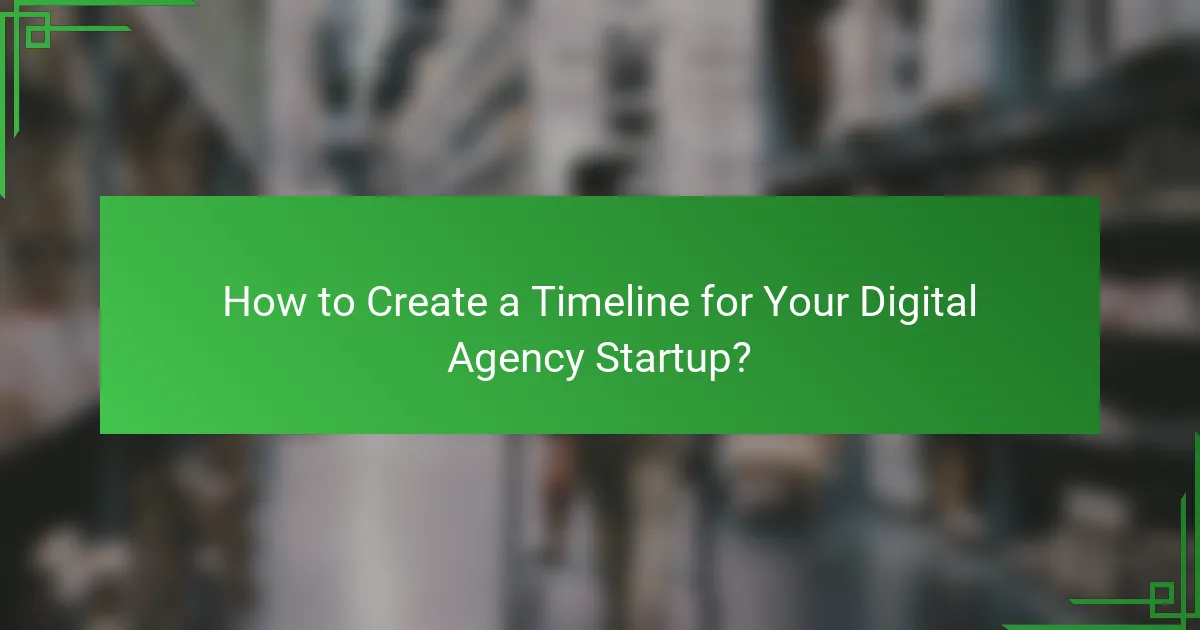
How to Create a Timeline for Your Digital Agency Startup?
Creating a timeline for your digital agency startup involves outlining key phases and milestones to ensure a structured launch. This roadmap helps you allocate resources effectively and track progress toward your goals.
Phase 1: Research and planning
The first phase focuses on thorough research and strategic planning. Identify your target market, analyze competitors, and define your unique value proposition. This groundwork is essential for making informed decisions as you move forward.
Consider creating a SWOT analysis (Strengths, Weaknesses, Opportunities, Threats) to clarify your position in the market. Set realistic goals and timelines for each aspect of your research to maintain focus and momentum.
Phase 2: Branding and website development
In the branding and website development phase, establish your agency’s identity through a compelling brand strategy. This includes designing a logo, selecting color schemes, and crafting a consistent voice that resonates with your audience.
Simultaneously, develop a user-friendly website that showcases your services and portfolio. Aim for a responsive design that works well on both desktop and mobile devices. Ensure your site is optimized for search engines to enhance visibility.
Phase 3: Marketing launch
The marketing launch phase is critical for attracting clients and generating leads. Develop a comprehensive marketing strategy that includes social media campaigns, content marketing, and email outreach. Utilize analytics tools to track engagement and adjust your tactics as needed.
Consider setting a budget for paid advertising to boost your visibility initially. Monitor your campaigns closely to determine what works best, and be prepared to pivot your strategy based on performance metrics.

What Strategies Should You Implement for Success?
To achieve success in a digital agency startup, focus on effective client acquisition, strategic partnerships, and clear service differentiation. Implementing these strategies will help establish a strong market presence and foster sustainable growth.
Client acquisition strategies
Client acquisition strategies are essential for attracting new customers and building a robust client base. Consider utilizing a mix of inbound marketing techniques, such as content marketing and SEO, alongside outbound methods like targeted advertising and networking events.
Offering free consultations or trial services can entice potential clients to engage with your agency. Additionally, leveraging social media platforms to showcase your work and client testimonials can enhance your visibility and credibility.
Partnership opportunities
Forming partnerships can significantly expand your agency’s reach and capabilities. Collaborate with complementary businesses, such as web development firms or marketing consultants, to offer bundled services that provide greater value to clients.
Consider joining local business networks or industry associations to connect with potential partners. These relationships can lead to referrals and shared resources, ultimately benefiting both parties.
Service differentiation
Service differentiation is crucial in a competitive market. Identify what sets your agency apart from others, whether it’s specialized expertise, unique service offerings, or exceptional customer service. Clearly communicate these differentiators in your marketing materials.
For example, if your agency specializes in eco-friendly digital solutions, emphasize this in your branding and outreach efforts. Regularly assess market trends to adapt your services and maintain a competitive edge.
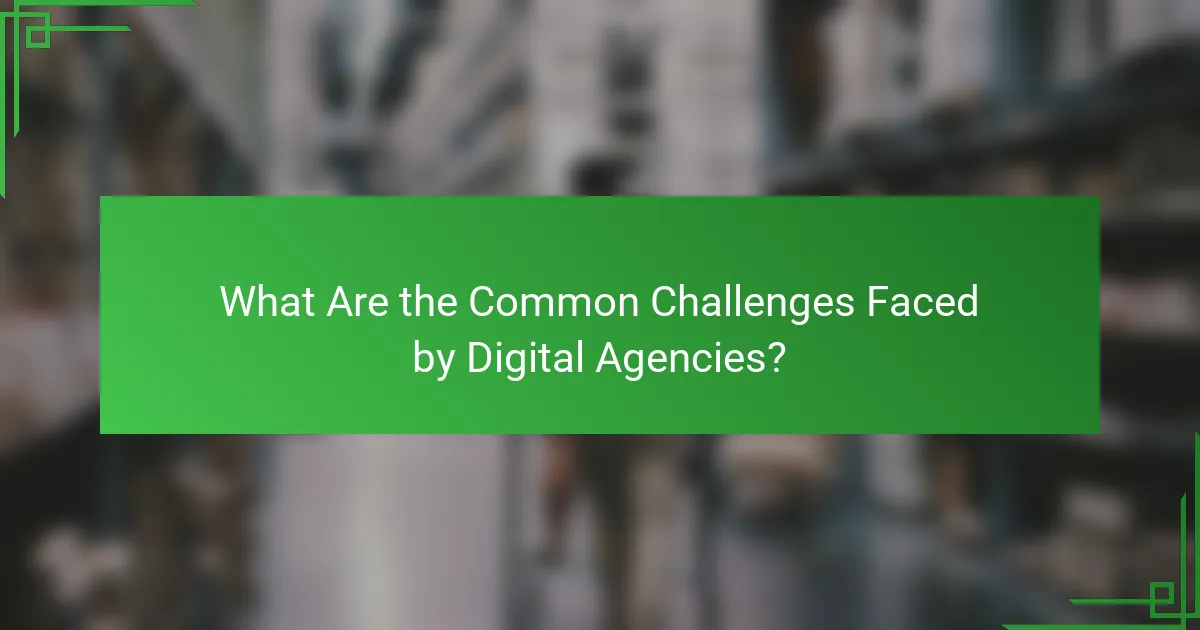
What Are the Common Challenges Faced by Digital Agencies?
Digital agencies often encounter several challenges that can hinder their growth and success. Key issues include client retention, market competition, and effective resource management.
Client retention issues
Maintaining long-term relationships with clients is a significant challenge for digital agencies. High turnover rates can lead to inconsistent revenue and increased marketing costs to acquire new clients.
To improve client retention, agencies should focus on delivering exceptional service, regular communication, and demonstrating measurable results. Implementing feedback loops can help agencies understand client needs and adjust their strategies accordingly.
Competition in the market
The digital agency landscape is highly competitive, with numerous players offering similar services. Differentiating your agency through unique value propositions is crucial for standing out.
Agencies should conduct market research to identify gaps in services or emerging trends. Establishing a strong brand identity and leveraging niche markets can also help reduce competition and attract specific client segments.
Resource management
Effective resource management is vital for the operational efficiency of digital agencies. Poor allocation of resources can lead to project delays and budget overruns.
Agencies should utilize project management tools to track workloads and deadlines. Regularly reviewing resource allocation and adjusting based on project demands can help optimize performance and ensure timely delivery of services.
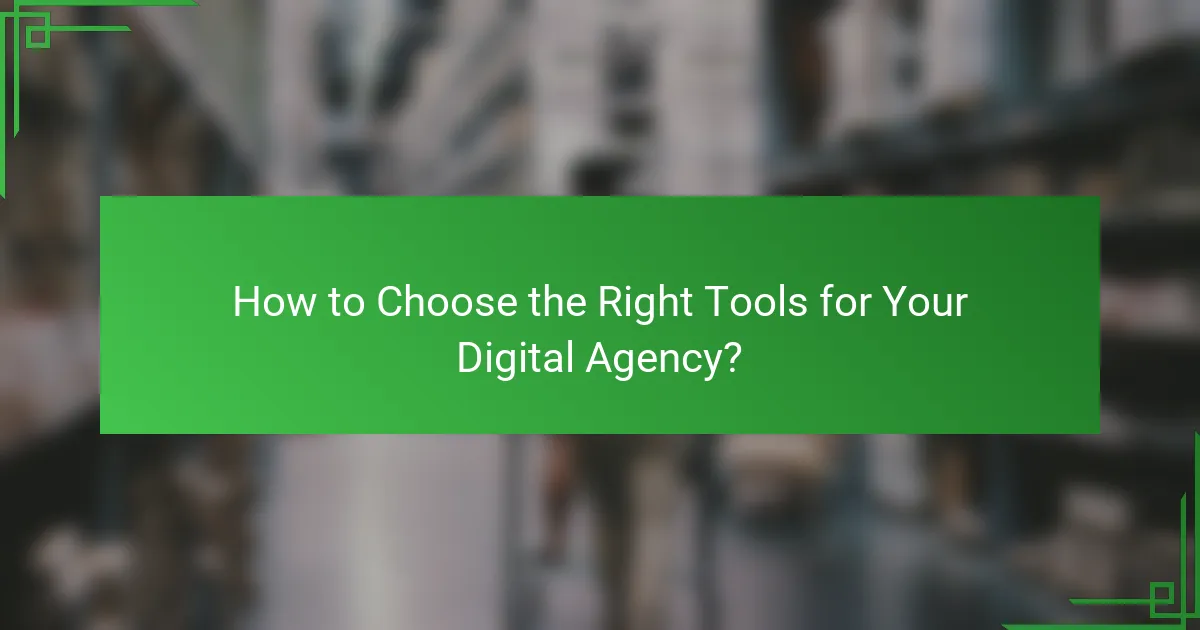
How to Choose the Right Tools for Your Digital Agency?
Selecting the right tools for your digital agency is crucial for efficiency and success. Focus on tools that enhance collaboration, streamline workflows, and meet your specific service offerings.
Assess Your Agency’s Needs
Begin by evaluating the specific needs of your agency. Consider the services you offer, such as web design, SEO, or social media management, and identify tools that cater to those areas. For instance, a project management tool like Trello or Asana can help organize tasks, while SEO tools like SEMrush or Ahrefs can enhance your search visibility.
Make a list of essential features you require, such as reporting capabilities, integrations with other software, and user-friendliness. This will guide your selection process and ensure you choose tools that align with your operational goals.
Compare Costs and Budget
Cost is a significant factor when choosing tools for your digital agency. Evaluate the pricing models of different software options, which can range from monthly subscriptions to one-time fees. For example, tools like Canva may have free versions, while advanced features come at a premium.
Set a budget that accounts for both immediate and long-term expenses. Remember to consider potential hidden costs, such as training or additional features, to avoid overspending.
Evaluate Integration Capabilities
Integration capabilities are vital for ensuring your tools work seamlessly together. Look for software that can connect with your existing systems, such as CRM platforms or email marketing tools. This will enhance data flow and reduce manual entry, saving time and minimizing errors.
Check if the tools you are considering offer APIs or built-in integrations with popular platforms like Zapier. This can significantly enhance your agency’s operational efficiency.
Seek User Feedback and Reviews
Before finalizing your tool selection, seek feedback from current users. Online reviews and testimonials can provide insights into the strengths and weaknesses of the tools you are considering. Look for platforms that have a strong user community or offer customer support.
Engaging with user forums or social media groups can also help you gather real-world experiences and tips on maximizing the effectiveness of the tools.
